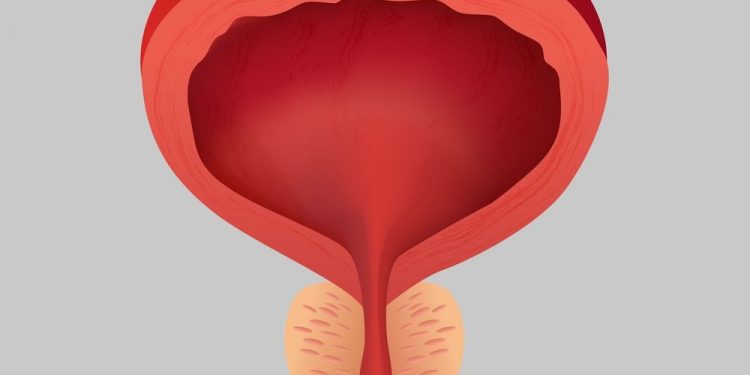Prostate cancer is a cancer that grows in the prostate gland, which is about the size of a walnut and lies just below the bladder and in front of the urethra. The cancer starts when cells in the prostate develop changes in their DNA (which contains instructions for making proteins). These changes cause the cells to grow faster than normal and continue growing, even when they should die. The cancer can also spread from the prostate to other parts of the body.
Early on, the cancer may not cause any symptoms at all. In some cases, it can take years before it becomes obvious that something is wrong. The first signs of the disease are usually a weak flow of urine, and in some men this might be accompanied by pain around the pelvis or lower back when sitting. Later on, the cancer may cause symptoms such as blood in the urine or difficulty emptying the bladder. In some men, the cancer can spread to the bones, causing a feeling of bone pain which might be present most of the time and can wake you up at night or feel like a stabbing sensation when you are standing or walking. It can also cause back and hip pain and might make it difficult to move. If the tumour presses on the spinal cord, this will stop your nerves from working properly, and you might experience numbness or weakness in your legs.
If you are experiencing any of these symptoms, you should talk to your doctor. However, it is important to remember that many of these symptoms can also be caused by other health conditions, such as an enlarged prostate or benign prostatic hyperplasia (BPH). If you are over 50 and have any of these symptoms, it is especially important to talk with your doctor.

It is possible that your doctor will recommend further tests to check for prostate cancer. These may include a physical exam, blood work and a PSA test. PSA is a chemical that is produced by the prostate and is found in higher levels in people with cancer of the prostate. A PSA level above 4.0 is considered high. The other test that is often recommended is an MRI or CT scan, which can show images of the prostate and any areas that are suspicious for cancer. The results of these tests will help your healthcare provider decide whether or not to biopsy the area.
Once prostate cancer has spread, it cannot be cured. But treatments such as hormone therapy, surgery and radiation can control the cancer and relieve symptoms for some time. If you have advanced prostate cancer, there are also symptom control teams in most cancer units which can help you manage your symptoms and provide support. They can be contacted through your GP, hospices or hospital cancer centres. They can visit you at home, if that is preferred. They can also offer financial support, if necessary.









